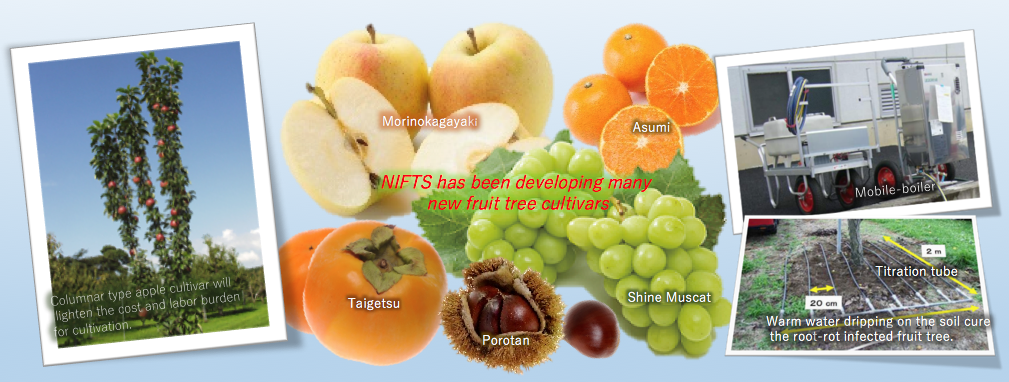Institute of Fruit Tree and Tea Science, NARO (NIFTS) conducts basic and innovative research to provide an efficient and stable supply of excellent quality fruits and tea, and contribute to the advancement of fruit production and to the enrichment of dietary life in Japan.
R&D on Fruit Tree Science

Research on fruit tree science at NIFTS focuses on the main fruit trees grown in Japan such as citrus, apple, grape, Japanese pear, peach, persimmon, chestnut etc.
We promote the development of promising cultivars. The major targets for breeding are ease of eating, high content of functional components related to health benefits for citrus, intense coloring for apple and grape, self-compatibility, multiple disease resistance for Japanese pear and pollination constant non-astringent cultivar for persimmon respectively in addition to high eating quality. To make breeding more efficient, we are also developing DNA markers related to important traits for marker-assisted selection. In line with NARO's research initiatives on sustainable agricultural production, we are developing technologies to save labor and cost required for fruit production and technologies to alleviate bad effect of global warming. We also pursue the development of pest control technologies using biotic function and the construction of integrated pest management system in order to contributes to establishment of environmentally friendly fruit production system.
As part of NARO's research initiatives on food functionality, researches to elucidate fruit functionality are underway in cooperation with medical sectors. We are also developing technologies to maintain fruit quality during storage based on analysis of fruit composition changes and gene expression profiling.
R&D on Tea Science
We have been conducting research on advancing tea production technologies, development of new tea cultivars, and promoting the health benefits of products derived from tea.
The major targets for tea breeding include tea with multiple pest resistance, diverse flavor, and novel functional tannins. In terms of developing an efficient production system, research on using a precision fertilizer applicator and other technologies and the development of a low cost, labor-saving tea production system are being conducted.
As part of NARO's initiatives on food functionality, research on elucidation and effective utilization of the functionalities of tea are being conducted. New product development through the use of functionalities of tea is in progress.
Evaluation technologies for flavor and other sensory properties of tea are also being developed and improved with the aim to develop an objective method for evaluation of Japanese green tea tastes.
History
- 1896: The Tea Research Station was established.
- 1902: The horticultural division was established in the National Agricultural Research Station in Okitsu, Shizuoka Pref.
- 1921: The National Horticultural Research Station was divided and the Fruit Tree Research Station was established.
- 1973: Fruit tree research was separated from the Divisions of Vegetable crops and that of Ornamental crops in established as the Fruit Tree Research Station of the Ministry of Agriculture and Forestry.
- 1986: The National Research Institute of Vegetables, Ornamental Plants and Tea (NIVOT) was established.
- 2001: The National Institute of Fruit Tree Science (NIFTS) and the National Institute of Vegetable and Tea Science (NIVTS) were separately established as institutes of the National Agricultural Research Organization (NARO).
- 2003: The National Agricultural Research Organization (NARO) was renamed as the National Agricultural Bio-oriented Research Organisation. The National Institute of Fruit Tree Science (NIFTS) and the National Institute of Vegetable and Tea Science (NIVTS) remained as separate institutes.
- 2016: The Institute of Fruit Tree and Tea Science, NARO (NIFTS) was established as an institute of the National Agriculture and Food Research Organization (NARO).




